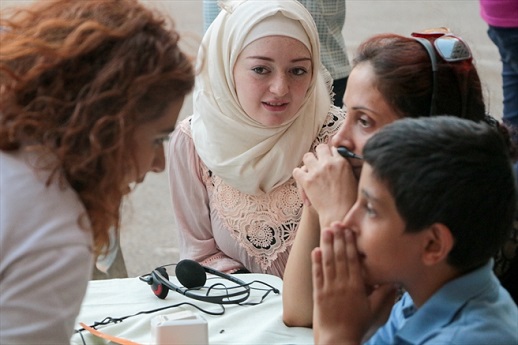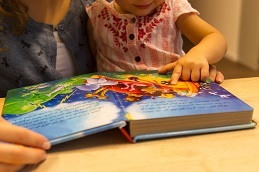
Courtesy Open Doors International
Life hasn’t been easy for 28-year-old Syrian mother Kristina, a Christian of Armenian descent, who lived with her husband in Aleppo long before the civil war started in 2011.
It was in that besieged city that Kristina gave birth to her firstborn daughter, 18 months ago. She’s brought the little girl to the house where a World Watch Monitor contact meets her. While her mother talks, the toddler explores the room.
“Please close the door, I’d like to keep an eye on her,” Kristina asks, not letting her child out of her sight.
With the pain still visible in her eyes, Kristina recalls her first days of being a mother in the spring of 2015 – the war raging outside, electricity, gas and water cut off most of the time and her family unable to visit and help her.
“The first two weeks after my daughter was born were the hardest in my life,” Kristina says. “It was so cold that we put our mattresses on the living room floor, the warmest room in the house. There we lived for two weeks on the ground, wrapped in blankets.”
As soon as it was safe, Kristina, her husband and her baby daughter travelled to neighbouring Lebanon to safety. At first it was intended to be a short trip, but when the violence increased and also the Christian part of Aleppo was being bombed, the young family decided to wait for the end of the war before returning to Syria.

her daughter read a children’s story.
World Watch Monitor
“I can’t let my baby girl grow up amidst all those dangers,” Kristina says.
With the violence continuing and worsening, gradually more Christians left Aleppo. In Kristina’s church, now only 10 per cent of the regular church-goers are left, she hears from friends.
“But you know what’s surprising? The church is still full; displaced people take their place. Especially Muslims are coming to the church now,” she says.
In Syria, the Christian children’s activities draw the most attention, Kristina says. A lot of Syrians from other parts of Aleppo – the fighting is heaviest in Muslim areas – have fled to the Christian areas to seek refuge. For many Muslims, it is the first time they have mixed with Christians.
“Many Muslims were genuinely surprised when they met Christian women in our churches willing to serve them. Their image was that all Christian women spend most of their days dancing in night clubs and drinking alcohol! Meeting each other was a shock, both for them and for us,” says Kristina.
Kristina also says the Muslim women were surprised to see that churches offered support and programmes for all Syrians, not just for Christians.
“Their mosques don’t do that,” Kristina says. “Many are re-thinking the faith they grew up in and have dropped their hostility towards Christians.”
Many Muslims were genuinely surprised when they met Christian women in our churches willing to serve them. Their image was that all Christian women spend most of their days dancing in night clubs and drinking alcohol! Meeting each other was a shock, both for them and for us.
A growing number of Muslim children have been attending the children’s activities, where the Bible is opened daily.
“The mothers are okay with that,” says Kristina. “They see it as positive if their children learn about God. It’s the husbands who are stricter, usually.”
But, gradually, also the mothers and, in some cases, whole Muslim families have found their way to the church activities, including the services.
“That absolutely did not happen before the war,” Kristina says. “Still the Muslims are afraid – especially when entering and leaving the building – but they are there. The children have opened the church’s doors, then the women followed, and finally the men.”
Kristina says Muslim women “feel liberated when they notice the church doesn’t see them as merely machines only fit for cleaning, giving birth to children, and raising them, like many Muslim men do”.
“In Islam, many women don’t have any rights. When they feel how Christians really care for them, it feels like heaven for those women. They see it’s possible to live as independent women, to dream,” Kristina says.
Despite the war, Kristina speaks of a “golden age” for the Church in the Middle East.
“For the first time in history, Muslims are coming to us. The only thing we have to do is tell them the good news; they are waiting for it,” she says. “They realise that, when living in a Christian environment, the [Christian message] will be shared. They may even see it as a sign of weakness if it isn’t.”